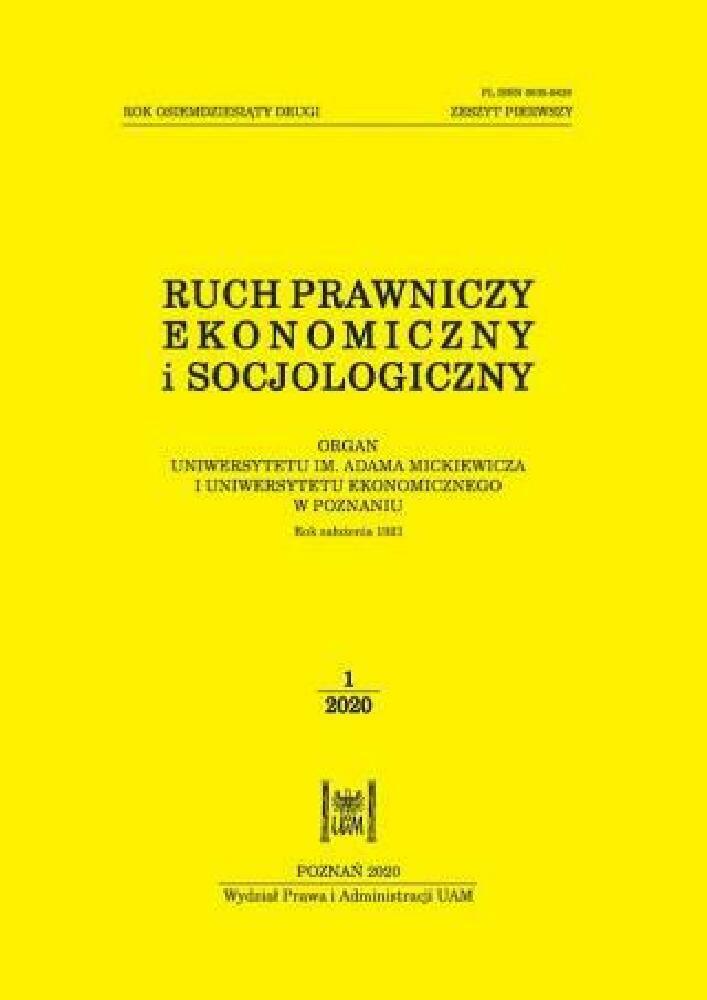Abstract
This article attempts to reconstruct legal regulations concerning the legal status of the prosecutor in proceedings before the State Tribunal. The reconstruction enables the legal nature of this function to be defined, as well as the procedural competences and rules for the appointment and circumstance resulting in the termination of tenure thereof. The analyses carried out concerning the legal nature of the prosecutor’s function lead to the conclusion that in the proceedings before the State Tribunal the prosecutor acts in their own name and thus is not a legal representative of Parliament. However, simultaneously the prosecutor’s function is not independent, as it is supervised by the appointing body. The author states that all the norms included in the Criminal Procedures Code pertaining to the public prosecutor apply thereto. However, the prosecutor must not drop the charges as this remains under the control of Parliament. Analyses on the appointment of the prosecutor allowed for the conclusion that the decision is to be made independently from the charges, whereas the Constitution does not require adopting resolutions with the absolute or qualified majority of votes. In relation to the termination of the prosecutor’s tenure, the author puts forward the thesis that it is possible for the prosecutor to be dismissed by Parliament at any time. The article is rounded off with considerations regarding the evaluation of statutory regulations on the investigated issue.
References
Bieńkowska, B. (1994). Stanowisko prawne oskarżyciela publicznego w polskim procesie karnym. Palestra 1/2(433/434): 57–64.
Gajewska-Kraczkowska, H. (2008). W sprawie stosowania niektórych przepisów ustawy o Trybunale Stanu. Przegląd Sejmowy 16(2): 190–192.
Garlicki, L. (1995). Zasada dyskontynuacji prac parlamentarnych. Studia Iuridica 28: 45–55.
Grajewski, J. (2003). Warunki ustawowe i wymogi formalne wstępnego wniosku o pociągnięcie do odpowiedzialności konstytucyjnej przed Trybunałem Stanu. Przegląd Sejmowy 11(1): 9–24.
Grajewski, K. (2016). Przedmiotowy zakres ochrony działalności wchodzącej w zakres sprawowania mandatu parlamentarnego (art. 105 ust. 1 Konstytucji). Przegląd Sejmowy 1(132): 9–35.
Grajewski, K. (2014). Uwagi do art. 6, [w:] K. Grajewski (red.), Komentarz do ustawy o wykonywaniu mandatu posła i senatora. Warszawa: 70–80.
Granat, M. (2006). Normatywny model odpowiedzialności konstytucyjnej w praktyce, [w:] W. Skrzydło (red.), Sądy i trybunały w konstytucji i w praktyce. Warszawa: 124–142.
Gromek, Z. (2008). Odpowiedzialność konstytucyjna a kontrola sejmowa. Wybrane zagadnienia. Przegląd Sejmowy 86(3): 57–76.
Grzegorczyk, T., Tylman, J. (2009). Polskie postępowanie karne. Warszawa.
Grzesik-Kulesza, M., Klejnowska, M. (2013). Uwagi do art. 11, [w:] G. Pastuszko (red.), Ustawa o Trybunale Stanu. Komentarz. [Online] Lex.
Olszewski, R. (2014). Role prokuratora w postępowaniu karnym. Prokuratura i Prawo 1: 43–59.
Pach, M. (2012). Odpowiedzialność Marszałka Sejmu (Senatu) wykonującego obowiązki Prezydenta RP. Przegląd Sejmowy 20(2): 35–56.
Pastuszko G., Klejnowska, M. (2013). Uwagi do art. 10, [w:] G. Pastuszko (red.), Ustawa o Trybunale Stanu. Komentarz. Lex.
Radajewski, M. (2015). Regulamin Zgromadzenia Narodowego – refleksje na tle art. 114 ust. 2 Konstytucji. Przegląd Sejmowy 1(126): 45–61.
Sarnecki, P. (2015). Immunitet posłów i senatorów w radach pozaparlamentarnych. Przegląd Sejmowy 6(131): 9–28.
Stefański, R.A. (1996). Prokurator w stadium jurysdykcyjnym postępowania karnego. Prokuratura i Prawo 12: 7–26.
Steinborn, S. (2008). Glosa do postanowienia Trybunału Stanu z dnia 29 marca 2007 r. (sygn. akt TSZ 1/06). Przegląd Sejmowy 16(2): 250–260.
Szepietowska, B. (1999). W sprawie skutków umorzenia przez Sejm postępowania w sprawie pociągnięcia do odpowiedzialności konstytucyjnej. Przegląd Sejmowy 7(3): 82–86.
Świda-Łagiewska, Z. (1983). Ogólne założenia proceduralne, [w:] Z. Świda-Łagiewska (red.), Trybunał Stanu w PRL. Warszawa: 159–190.
Waltoś, S. (2008). Proces karny. Zarys systemu. Warszawa.
Zaleśny, J. (2004). Odpowiedzialność konstytucyjna w prawie polskim okresu transformacji ustrojowej. Toruń.
License
Copyright (c) 2020 WPiA UAM

This work is licensed under a Creative Commons Attribution-NonCommercial-NoDerivatives 4.0 International License.





